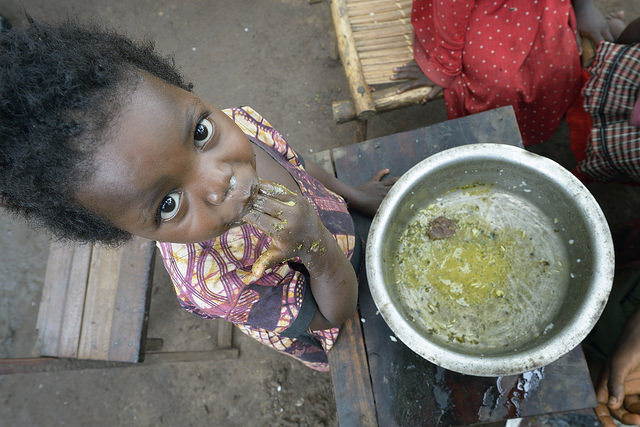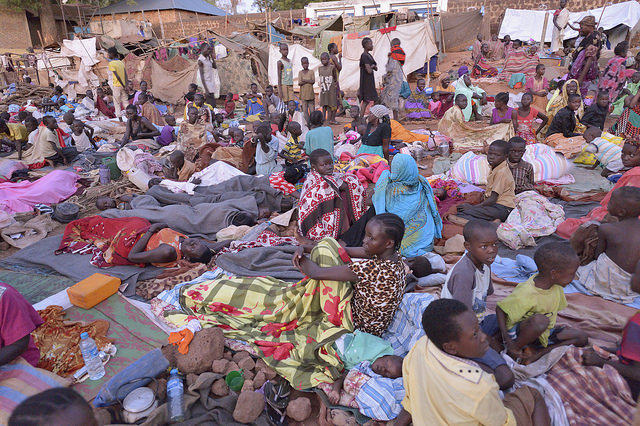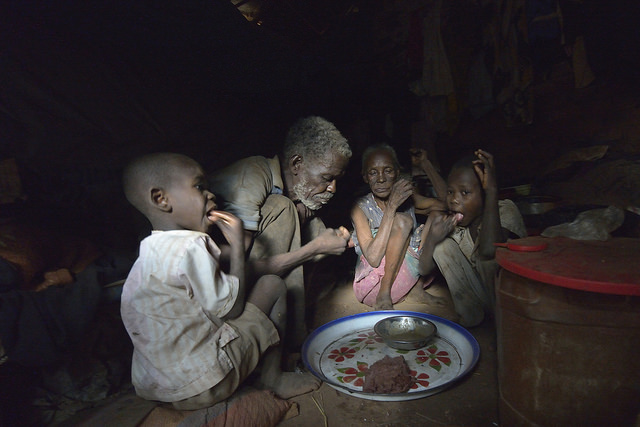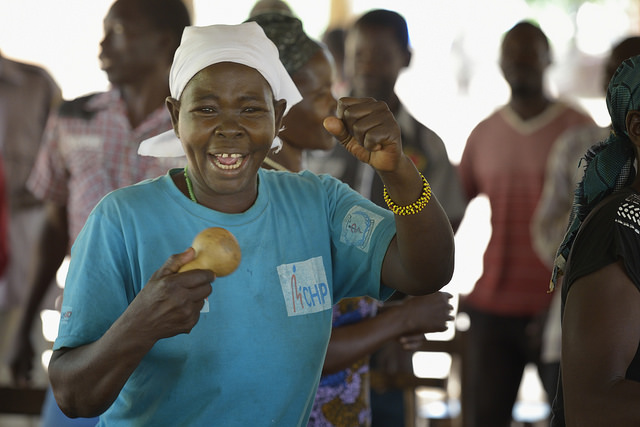“People can’t afford to buy food, they can’t grow food and aid agencies can’t deliver enough food to keep them alive,” said Sebastian Kämpf, who supports Caritas in Wau, South Sudan. “People are already dying with the worst still ahead.”
The first famine in 6 years was officially declared by the UN in parts of South Sudan in February, affecting more than 100,000 people. Even in places where it hasn’t been declared, people die due to hunger related illnesses. Around 5.5 million people in South Sudan face severe hunger and 7.5 million are in need of humanitarian aid and protection.
Starvation is writ large in the children, their bodies bloated by hunger. Over a quarter of a million of them will be affected by acute malnutrition this year. “It’s not like an earthquake that kills lots of people in a day,” said Kämpf. “It’s a slow death as the body becomes less able to resist disease.”

Two-year old Jennifer Angel enjoys the last of her family’s meal in a camp for more than 5,000 displaced people in Riimenze, in South Sudan’s Gbudwe State, what was formerly Western Equatoria. Photo by Paul Jeffrey/Caritas
After decades of war, South Sudan gained independence from Sudan in 2011. There were high hopes for the country. However, rivalry between the president, Salva Kiir, who is from the Dinka tribe, and his then vice president, Riek Machar, who is Nuer, descended into ethnic violence in late 2013. Renewed conflict since mid-2016 has created a catastrophe of biblical proportions.
In Wau, fighting broke out between government soldiers and opposition groups leaving more than 400 people dead and forcing 120,000 from their homes. “Many people came to the large Catholic Church compound,” said Kämpf. “At the height of crisis there were 25,000 people.”
Fr Moses Peter, the Caritas diocesan emergency coordinator, became the camp manager. “We had a surplus of food from an ongoing child malnutrition project which we used to feed the families in the compound,” he said.
“Then when it became safe for the international aid agencies, we acted as a coordination point to improve conditions, building latrines, providing a learning space for children and improving shelter. As people settled, we could provide shelter, water and food.”
Periodic fighting has continued, with each attack forcing more people from their homes. The worst was in April, when two army generals were killed sparking a killing spree by government troops in Wau.
Things have calmed since the introduction of a multi-tribal security force, but many will not go home. Currently there are 13,000 people in four different compounds. The main one has 7000 and the others have about 2000 people each.
“There are a large number of people who prefer to stay in the church compound or with the UN. Apart from safety, by having somebody in the compound the family can get food rations,” said Fr. Peter.

People waking up the morning after sleeping in the open in a camp for over 5,000 internally displaced persons in an Episcopal Church compound in Wau, South Sudan. Photo by Paul Jeffrey/Caritas
Those in the compound only get half rations from the UN’s World Food Programme. “You’re still losing weight, but it keeps you alive,” said Kämpf. Funding for the humanitarian response in South Sudan is only around 14 percent, meaning aid agencies are forced to cut rations.
The lack of law and order also means that huge swathes of the rural area are cut off. “We don’t know what the situation is like out there, but we can imagine it’s much worse,” said Kämpf.
Among those who fled and have returned are the Church volunteers. Before the current crisis, they would help the extremely poor, the disabled and the elderly.
“When the volunteers made it back from the bush, they continued where they’d left off with the displaced,” said Kämpf. “For example, it’s difficult for a disabled person to mill the maize, which is a two hour back breaking job using stones. So the volunteers help prepare meals.”
South Sudan is the most dangerous country for aid workers to operate. It is also one of the most expensive. According to research by Caritas Internationalis provided by members, it is almost 12 times as costly per beneficiary to implement projects in South Sudan than it is in Kenya.

A family shares a meal inside their shelter in a camp for more than 12,000 internally displaced persons located on the grounds of the Roman Catholic Cathedral of St. Mary in Wau, South Sudan. Photo by Paul Jeffrey/Caritas
The severely under developed and under maintained roads makes 60 per cent of the country inaccessible by road during the rainy season. Insecurity and bad roads means it is difficult to truck food into Wau or to get that food from the town to the rural areas.
“Cereal production last year was at its lowest level since the conflict started. Food prices are inflated due to lack of availability. There is an economic crisis with the collapse of the South Sudanese Pound so people can’t buy food. And they can’t go into the fields without being killed,” said Kämpf. “People are eating leaves, wild berries and grass.”
More than 1.8 million people have left South Sudan altogether, sparking the world’s fastest-growing refugee crisis.
The conflict in South Sudan continues to fragment with greater unpredictability. Prospects for peace remains bleak despite renewed international mediation efforts. Pope Francis cancelled a trip to South Sudan as progress from the civil war’s protagonists remains deadlocked.
“The people of South Soudan just want peace. We want this war to end,” said Fr Peter.

A woman dances with other participants in a church-sponsored trauma healing workshop. Photo by Paul Jeffrey/Caritas
